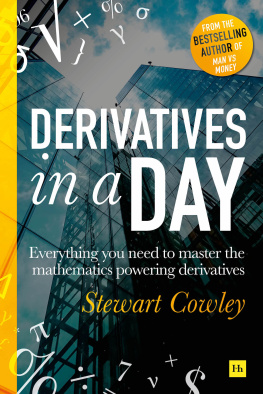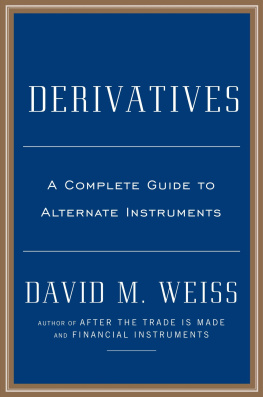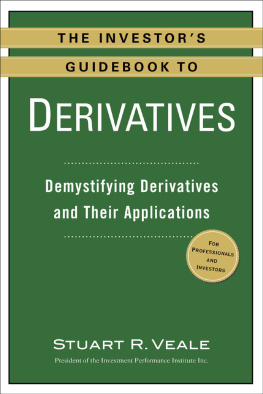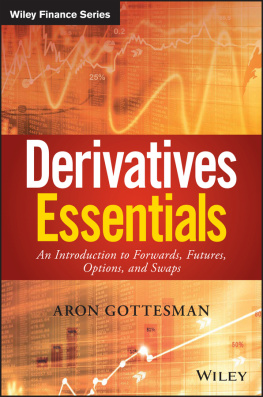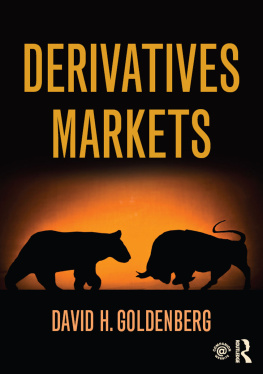Durbin - All About Derivatives
Here you can read online Durbin - All About Derivatives full text of the book (entire story) in english for free. Download pdf and epub, get meaning, cover and reviews about this ebook. City: New York, year: 2011, publisher: McGraw-Hill Education, genre: Romance novel. Description of the work, (preface) as well as reviews are available. Best literature library LitArk.com created for fans of good reading and offers a wide selection of genres:
Romance novel
Science fiction
Adventure
Detective
Science
History
Home and family
Prose
Art
Politics
Computer
Non-fiction
Religion
Business
Children
Humor
Choose a favorite category and find really read worthwhile books. Enjoy immersion in the world of imagination, feel the emotions of the characters or learn something new for yourself, make an fascinating discovery.

- Book:All About Derivatives
- Author:
- Publisher:McGraw-Hill Education
- Genre:
- Year:2011
- City:New York
- Rating:4 / 5
- Favourites:Add to favourites
- Your mark:
- 80
- 1
- 2
- 3
- 4
- 5
All About Derivatives: summary, description and annotation
We offer to read an annotation, description, summary or preface (depends on what the author of the book "All About Derivatives" wrote himself). If you haven't found the necessary information about the book — write in the comments, we will try to find it.
All About Derivatives — read online for free the complete book (whole text) full work
Below is the text of the book, divided by pages. System saving the place of the last page read, allows you to conveniently read the book "All About Derivatives" online for free, without having to search again every time where you left off. Put a bookmark, and you can go to the page where you finished reading at any time.
Font size:
Interval:
Bookmark:
All About DERIVATIVES
FULLY REVISED SECOND EDITION
MICHAEL DURBIN


Copyright 2011 by The McGraw-Hill Companies, Inc. All rights reserved. Except as permitted under the United States Copyright Act of 1976, no part of this publication may be reproduced or distributed in any form or by any means, or stored in a database or retrieval system, without the prior written permission of the publisher.
ISBN: 978-0-07-174352-5
MHID: 0-07-174352-9
The material in this eBook also appears in the print version of this title: ISBN: 978-0-07-174351-8, MHID: 0-07-174351-0.
All trademarks are trademarks of their respective owners. Rather than put a trademark symbol after every occurrence of a trademarked name, we use names in an editorial fashion only, and to the benefit of the trademark owner, with no intention of infringement of the trademark. Where such designations appear in this book, they have been printed with initial caps.
McGraw-Hill eBooks are available at special quantity discounts to use as premiums and sales promotions, or for use in corporate training programs. To contact a representative please e-mail us at bulksales@mcgraw-hill.com.
This publication is designed to provide accurate and authoritative information in regard to the subject matter covered. It is sold with the understanding that neither the author nor the publisher is engaged in rendering legal, accounting, securities trading, or other professional services. If legal advice or other expert assistance is required, the services of a competent professional person should be sought.
From a Declaration of Principles Jointly Adopted by a Committee of the American Bar Association and a Committee of Publishers and Associations
Trademarks: McGraw-Hill, the McGraw-Hill Publishing logo, All About, and related trade dress are trademarks or registered trademarks of The McGraw-Hill Companies and/or its affiliates in the United States and other countries and may not be used without written permission. All other trademarks are the property of their respective owners. The McGraw-Hill Companies is not associated with any product or vendor mentioned in this book.
TERMS OF USE
This is a copyrighted work and The McGraw-Hill Companies, Inc. (McGraw-Hill) and its licensors reserve all rights in and to the work. Use of this work is subject to these terms. Except as permitted under the Copyright Act of 1976 and the right to store and retrieve one copy of the work, you may not decompile, disassemble, reverse engineer, reproduce, modify, create derivative works based upon, transmit, distribute, disseminate, sell, publish or sublicense the work or any part of it without McGraw-Hills prior consent. You may use the work for your own noncommercial and personal use; any other use of the work is strictly prohibited. Your right to use the work may be terminated if you fail to comply with these terms.
THE WORK IS PROVIDED AS IS. McGRAW-HILL AND ITS LICENSORS MAKE NO GUARANTEES OR WARRANTIES AS TO THE ACCURACY, ADEQUACY OR COMPLETENESS OF OR RESULTS TO BE OBTAINED FROM USING THE WORK, INCLUDING ANY INFORMATION THAT CAN BE ACCESSED THROUGH THE WORK VIA HYPERLINK OR OTHERWISE, AND EXPRESSLY DISCLAIM ANY WARRANTY, EXPRESS OR IMPLIED, INCLUDING BUT NOT LIMITED TO IMPLIED WARRANTIES OF MERCHANTABILITY OR FITNESS FOR A PARTICULAR PURPOSE. McGraw-Hill and its licensors do not warrant or guarantee that the functions contained in the work will meet your requirements or that its operation will be uninterrupted or error free. Neither McGraw-Hill nor its licensors shall be liable to you or anyone else for any inaccuracy, error or omission, regardless of cause, in the work or for any damages resulting there from. McGraw-Hill has no responsibility for the content of any information accessed through the work. Under no circumstances shall McGraw-Hill and/or its licensors be liable for any indirect, incidental, special, punitive, consequential or similar damages that result from the use of or inability to use the work, even if any of them has been advised of the possibility of such damages. This limitation of liability shall apply to any claim or cause whatsoever whether such claim or cause arises in contract, tort or otherwise.
To the splendor of Mom and the memory of Dad
Chapter 1
Derivatives in a Nutshell
Chapter 2
The Forward Contract
Chapter 3
The Futures Contract
Chapter 4
The Swap Contract
Chapter 5
The Option Contract
Chapter 6
Credit Derivatives
Chapter 7
Using Derivatives to Manage Risk
Chapter 8
Pricing Forwards and Futures
Chapter 9
Pricing Swaps
Chapter 10
Pricing Options
Chapter 11
Hedging a Derivatives Position
Chapter 12
Derivatives and the 2008 Financial Meltdown
The public perception of financial derivatives has certainly changed since the publication of the first edition of All About Derivatives. More people are curious about them, asking questions about them, and wanting to know more than ever just what these seemingly bizarre financial instruments are all about.
Nearly everyone, it seems, knows that derivatives played a role in the 2008 global financial crisiseven if they cant begin to say how. What many people dont know is that the derivatives that got us into all that trouble were credit derivatives, a relatively new type of derivative bearing almost no resemblance to the traditional stock, interest rate, and currency derivatives that have been used extensively for many decades. And they were traded in the overthe-counter (OTC) market, a free-for-all venue that lackedat the timethe trade standardization and clearing features of the listed or exchange markets where derivatives have historically traded. Traditional derivatives are price guarantees used to protect against (or wager on) future price changes. Credit derivatives guarantee not the price of something, but rather the ability of borrowers of moneysay, holders of mortgagesto repay their loans. Those are very different things.
Alas, they are all considered derivatives, and theres not much we can do about that. We can, however, make a modest effort to understand the distinction. An entirely new chapter, , Derivatives and the 2008 Financial Meltdown, is devoted to explaining the role of the credit default swap (CDS) during that painful economic period. This chapter also explains the much-publicized collateralized debt obligation (CDO), which is technically not a derivative security but can beand wascreated synthetically using credit default swaps.
In addition, every bit of the first edition was reviewed to make sure it is still relevant to whats going on today with derivatives, and to clean up a few errors (some rather embarrassing) the author failed to catch the first time around. Any errors that might have slipped into this one will be noted at www.michaelpdurbin.com .
I once had a college professor who would mark papers with BGO! wherever he caught a student wasting the readers time on a blinding glimpse of the obvious. He would certainly mark this page as such, because it is indeed obvious how indebted I am to the many readers who took the time to e-mail me with comments, suggestions, and errors after reading the first edition of
Next pageFont size:
Interval:
Bookmark:
Similar books «All About Derivatives»
Look at similar books to All About Derivatives. We have selected literature similar in name and meaning in the hope of providing readers with more options to find new, interesting, not yet read works.
Discussion, reviews of the book All About Derivatives and just readers' own opinions. Leave your comments, write what you think about the work, its meaning or the main characters. Specify what exactly you liked and what you didn't like, and why you think so.



